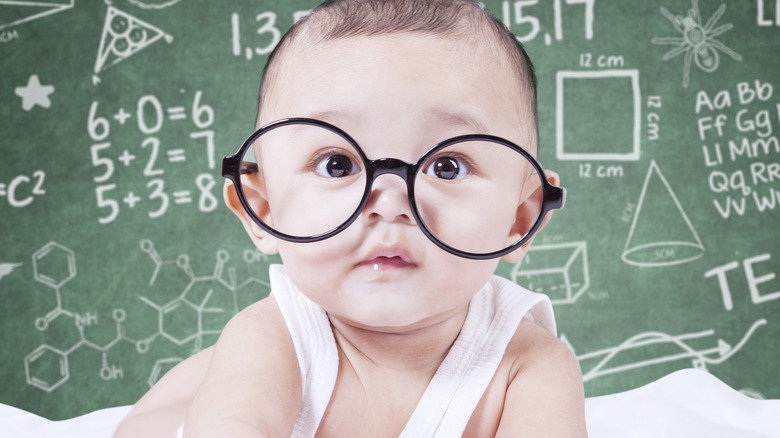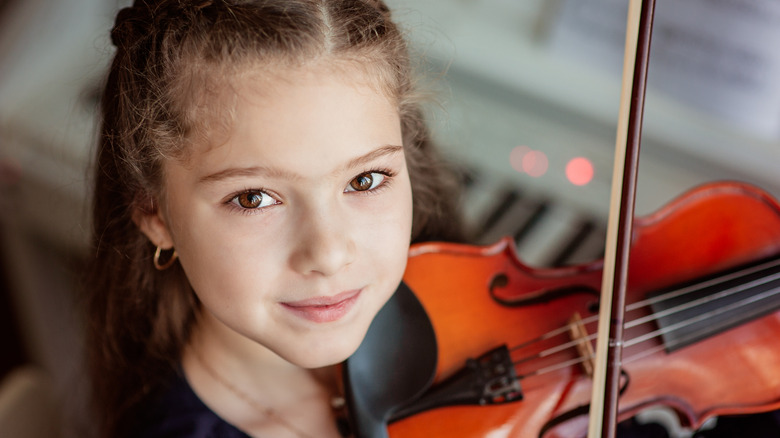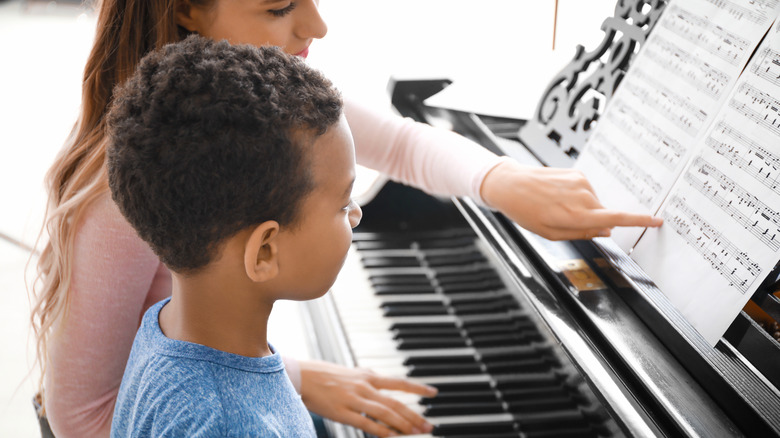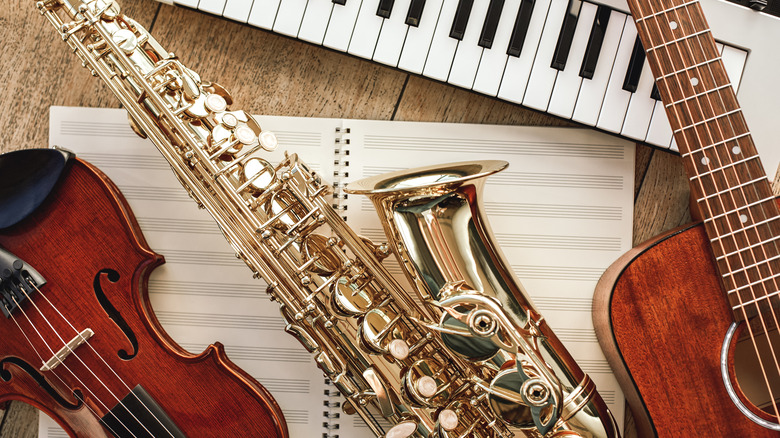What Does Science Actually Say About The Mozart Effect In Babies?
Boy, raising kids sure is hard, right? You've got to stuff them full of healthy food, make sure they don't run into the road, and keep them busy enough on a lazy Sunday afternoon to not drive you insane. You've also got to properly educate them not only about academic stuff, but life stuff — not a small task. So wouldn't it help if your kid was, shall we say, on the bright side? No problem. Just pop in a CD and that toddler of yours will be scribbling calculus in no time.
Back in 1998, when the now-familiar "Baby Mozart" products came out, this is the basic pitch that U.S. parents were sold. The idea was simple — dubiously simple. Just have your baby listen to genius composers like Mozart and Bach — not that dumb-dumb pop stuff — and they'll become geniuses themselves. Parenting done. We've got Georgia Governor Zell Miller to thank for helping popularize this idea. The New York Times quotes him as saying, "No one questions that listening to music at a very early age affects the spatial, temporal reasoning that underlies math and engineering and even chess," and, ”Having that infant listen to soothing music helps those trillions of brain connections to develop.”
Of course, anyone who's listened to Mozart or Bach — profoundly gifted composers — know how wonderful their music is, and how enriching it is for the mind and soul. But does listening to it really enhance child intelligence?
The brain-boosting sounds cometh
Governor Miller's idea about classical music making kids smarter — the Mozart effect, as it came to be called — got bundled into his overall gubernatorial campaign. As The New York Times reported, he wanted to take $105,000 from the $12.5 billion 1998 Georgia state budget and use it to ship CDs or cassettes to 100,000 Georgia households where there were newborns. He even played some of Beethoven's "Ode to Joy" to his state legislation (who presumably were not infants) and said, "Now don't you feel smarter already? Smart enough to vote for this budget item, I hope."
Okay, and –? you might ask. That's not exactly insidious. If some parents get free and beautiful music for their household, who cares? Well, the problem rests in the Mozart effect's unverifiable science. We all know what happens when doubtfully factual pop-science circulates among the masses, right? Besides the simple spread of misinformation, notions like the Mozart effect leave the public open to commercial exploitation. It's an invitation to peddlers of would-be magic intelligence boosters.
As Scientific American says, Miller got his idea from a single study published in Nature in 1993. The study used a paltry sample size of 36 "college kids" who listened to 10 minutes of K.448 (posted on YouTube), a Mozart sonata in D-major for two pianos (per Classic FM). Afterwards, the students performed better on spatial reasoning tasks involving imagining what unfolded paper looks like — that's it. That's nothing remotely close to the supposed Mozart effect.
A flurry of misinformation
Are we being too hard on folks who just want to throw on some tunes and watch their kid transform into a whiz? Frances Rauscher, Endowed Professor at the University of Wisconsin Oshkosh, told Scientific American in 2007, "I would simply say that there is no compelling evidence that children who listen to classical music are going to have any improvement in cognitive abilities. It's really a myth, in my humble opinion." And who is this distinguished professor? She's a co-author of the original 1993 Nature study that kicked off the Mozart effect myth — the one with 36 college kids.
So where did the baby genius thing come from? Rauscher's paper, per Scientific American, was cited 8.3 times more than the next most popular 1993 paper, written the legendary astronomer Carl Sagan. Moreover, it was cited not by academics, but by the U.S.' top 50 newspapers. This means that the general public was reading about it, not researchers. But is this enough to account for why the Mozart effect myth caught on like wildfire? In 2004, an analysis of the Mozart effect published in the British Journal of Social Psychology concluded, "It seems to be a circumscribed manifestation of a widespread, older belief that has been labeled 'infant determinism,' the idea that a critical period early in development has irreversible consequences for the rest of a child's life. It is also anchored in older beliefs in the beneficial powers of music."
Hands-on learning
So the Mozart effect caught on because lots of parents want the best for their kid, and want to hope that they can give their kid a better life (and that they're not failing as parents) — even hope with no information to back it up. Or as Frances Rauscher says in Scientific American, "I think parents are very desperate to give their own children every single enhancement that they can."
But is there any connection at all between listening to music and overall intelligence? Or any connections between exposure to music and increased performance in certain areas like memory or attention? Sites like Smart Parents list a whole litany of psychological and social benefits of exposure to music, but only cite other Smart Parent pages. Schools like Primrose Schools say the same, but then go on to advertise their own in-house musical program. Suffice it to say, such embellished or self-interested information only serves to confuse the issue for parents, much like the original 1993 Nature study that ignited a wildfire of interest in the apparent Mozart effect.
In the end, as Baby Center says, the issue boils down to age: Babies are just too young. It's children — actively engaged in their environment, actively learning, actively developing — who benefit from exposure to music, not infants (aside from maybe calming a baby down). And as Scientific American says, the real benefits come from playing an instrument with one's own body, not merely listening to it.
Many types of intelligence
So beyond the Mozart effect hype, what exactly are the benefits of your child learning to play an instrument, or of an actual musical education? The best answer would be: Musical training makes your child better at music. If someone practices karate, they get better at karate. If someone practices French, they get better at French. If someone plays the flute they get better at the flute. Action is key, not passive listening. The 20th century's most gifted songwriters invariably describe childhood engagement with music, and being encouraged by parents to play and sing — Paul McCartney, Dolly Parton, and Neil Young to name a few (all per Biography). We're not saying that your child is going to be the next Brahms if they take 60-minute piano lessons twice a week, but they'll definitely understand music better than if they didn't.
But what about other benefits? As a study published in Frontiers in Neuroscience explains, children with musical training perform better at attention and memory recall tasks, which should come as no surprise. They also have greater activity in areas of the brain associated with auditory encoding (also no shock), and executive functions connected to tasks like reading. And overall intelligence? There's really no such thing. Research like that of Howard Gardner, author of the 1983 book "Frames of Mind: The Theory of Multiple Intelligences," describes eight different types of intelligences, such as spatial intelligence, interpersonal intelligence, and musical intelligence, as CNBC outlines. Being musically smart is its own thing that doesn't connect to other domains.
A thriving product line
What's the current state of Mozart effect products? Have a look at the Genius Babies website, a company that capitalized on the original Mozart effect boom. They've been going strong since 1998, the same year that Georgia Governor Zell Miller first suggested incorporating classical music CDs into his state's budget. At this point Genius Babies has expanded way, way beyond music into entire lines of baby products for everyday life: crib mirrors, mobiles, flash cards, plushies, and much more. And while the individual products might be beneficial to some parents, it's important to remember that the whole business, and subsequent industry, was built on the back of incorrect information. Some might say "no harm, no foul." They also might consider actual musical training for their child.
Kids2 gives us a glimpse at the true scope of the entire "products that make your baby smart" industry. The company sells a massive list of items, and boasts trademarked brands like Baby Einstein, which produced the first Baby Mozart product in 1998, the "The Baby Einstein Music Box Orchestra" CD. They've got goods on Amazon, playlists on Spotify, apps on the Baby Mozart website, and more. None of this is insidious. But it goes to show exactly how far misinformation can be taken, and exactly how much parents actually want their kids to succeed.





